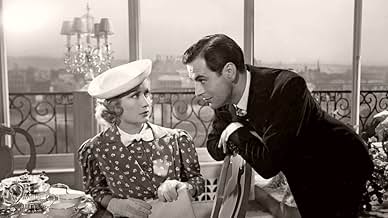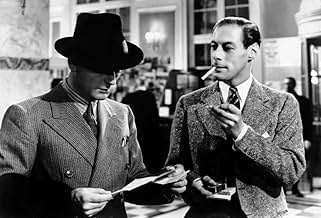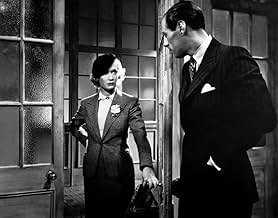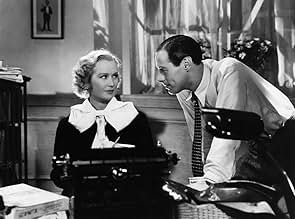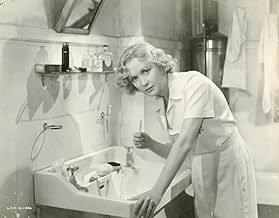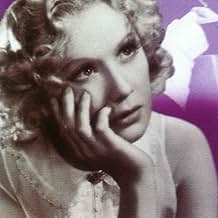अपनी भाषा में प्लॉट जोड़ेंActor Edmund Davey becomes a star overnight when his wife and co-star teams up with the secretary of a noted stage critic to produce a glowing review of his 'Othello'.Actor Edmund Davey becomes a star overnight when his wife and co-star teams up with the secretary of a noted stage critic to produce a glowing review of his 'Othello'.Actor Edmund Davey becomes a star overnight when his wife and co-star teams up with the secretary of a noted stage critic to produce a glowing review of his 'Othello'.
Lawrence Grossmith
- Stanley
- (as Laurence Grossmith)
Noël Coward
- Passer-by
- (बिना क्रेडिट के)
Rosamund Greenwood
- Pianist
- (बिना क्रेडिट के)
James Harcourt
- Porter
- (बिना क्रेडिट के)
Michael Hogarth
- Cassio
- (बिना क्रेडिट के)
Noel Howlett
- Cashier
- (बिना क्रेडिट के)
Paddy Morgan
- Kitty
- (बिना क्रेडिट के)
Nicholas Nadejin
- Iago
- (बिना क्रेडिट के)
फ़ीचर्ड समीक्षाएं
Theatre critic Mr Skeates's (A.E Matthews) secretary, Ann (Miriam Hopkins) re-writes a theatre review about Edmund (Sebastian Shaw) at the request of his wife, Barbara (Gertrude Lawrence) in order to paint Edmund in a good light. Following the review, Edmund has a successful career alongside his wife but Ann is given the sack. Edmund and Ann fall in love with each other but Barbara is still in the picture and they can only be together if Barbara is completely out of the way. Barbara and Edmund are both starring in Shaespeare's "Othello" and 'Desdemona''s death scene on stage seems the perfect opportunity for Edmund's 'Othello' to do what he deems necessary.
The women make this picture. Both Hopkins and Lawrence are good in their roles while a special mention must go to Laura Smithson as the maid "Katherine". She provides the best moment of the film when a painter (Sybil Grove) comes to try and blackmail her with a painting of Edmund and Ann together in the park - a painting that will cause scandal and obviously upset Barbara. The way that Katherine haggles down the price with the use of a knitting needle and a knife is most commendable and very amusing.
Unfortunately, the men most certainly are not Gods. They are very irritating with Sebastian Shaw coming off as the best, but only because he doesn't shout his way through the film or assault us with dialogue that is machine-gunned at us at 100mph. This is the technique used by both Matthews and Harrison and it is very irritating. It's as if they both thought - "hmm my character works for a newspaper. Let me think. I know, I'll talk really fast and shout a lot. Yeah, that's a good idea". Well it isn't and it ruins the film from the outset when we see the very pretentiously named A. E. Matthews dictate a review to Hopkins in this style. You think "Thank God!" when the scene is over, but then Harrison takes over with exactly the same style.
The story moves quite quickly but it has peculiar moments to it that don't make sense, eg, Barbara encouraging Ann and Edmund to spend time with each other, Edmund's love for Ann, and the ending where poor Ann is just discarded. We end the film feeling sorry for her. It's a film that is OK to watch with some irritating men and a couple of funny moments. Nothing more.
The women make this picture. Both Hopkins and Lawrence are good in their roles while a special mention must go to Laura Smithson as the maid "Katherine". She provides the best moment of the film when a painter (Sybil Grove) comes to try and blackmail her with a painting of Edmund and Ann together in the park - a painting that will cause scandal and obviously upset Barbara. The way that Katherine haggles down the price with the use of a knitting needle and a knife is most commendable and very amusing.
Unfortunately, the men most certainly are not Gods. They are very irritating with Sebastian Shaw coming off as the best, but only because he doesn't shout his way through the film or assault us with dialogue that is machine-gunned at us at 100mph. This is the technique used by both Matthews and Harrison and it is very irritating. It's as if they both thought - "hmm my character works for a newspaper. Let me think. I know, I'll talk really fast and shout a lot. Yeah, that's a good idea". Well it isn't and it ruins the film from the outset when we see the very pretentiously named A. E. Matthews dictate a review to Hopkins in this style. You think "Thank God!" when the scene is over, but then Harrison takes over with exactly the same style.
The story moves quite quickly but it has peculiar moments to it that don't make sense, eg, Barbara encouraging Ann and Edmund to spend time with each other, Edmund's love for Ann, and the ending where poor Ann is just discarded. We end the film feeling sorry for her. It's a film that is OK to watch with some irritating men and a couple of funny moments. Nothing more.
This melodramatic affair, with a comedic component prominent in its first half, showcases American Miriam Hopkins amidst an English cast and setting and she performs very well in a role that is not written in a unified fashion. Ann Williams (Hopkins) is personal secretary to Mr. Skeates, caustic theatre critic for the London Daily Post. Skeates has dictated to Ann a very negative review of a new production of Shakespeare's Othello, particularly focussed upon his perceived shortcomings of its titular lead, played by Edmond Davey (Sebastian Shaw). Before Ann has an opportunity for submitting the review to press, she is called on at her office by Barbara Halford (Gertrude Lawrence), the maligned performance's Desdemona and also Davey's wife. As a result of Barbara's entreaties in support of her husband, Ann alters the review causing Davey, who had suffered first-night jitters, to become a great success, after which Ann and he share mutual infatuation with complications ensuing. Director Walter Reisch is responsible for the work's storyline but the screenplay, written by others, falls short of his high standard. His direction is inventive throughout the quickly moving piece, and montage is seamless. Lawrence, a great actress, and Hopkins each displays keen awareness of the importance of body movement and control; there is not a slack moment when these share the screen. Indeed, the acting is quite good by most of the cast throughout, with the exception of the always peculiar Rex Harrison who performs as Ann's suitor with his customary prissy mannerisms; fortunately, his appearance time is minimal. Reisch, in accord with cinematographer Charles Rosher, provides thoroughly interesting visuals by way of cleverly designed shots employing fluid camerawork for tracking and full images as well as for closeups. As stated in the script by Skeates, the music is drawn from themes within the Othello Suite of Samuel Coleridge-Taylor, augmented by a melodic Geoffrey Toye score. In a whimsical scene, Skeates enters his office, populated by a bevy of Daily Post secretaries, while a phonograph plays a jazzy rendition of "Who's Afraid of the Big Bad Wolf?" Vincent Korda's interiors are superb for this production under the aegis of his brother Alexander and the costumes crafted by Rene Hubert are faultlessly designed. Only the age of the available print reveals an editing misstep or two. The highly capable control of extras comes from one of the assistant directors, Jack Clayton, renowned later as helmsman of his own productions. This engaging love triangle features locations scattered through London, including Hyde Park and Trafalgar Square. The footage from Shakespeare's play (the title is from Act III/Scene IV) is shot in the venerable Alhambra Music Hall (now the famous film theatre Odeon) in Leicester Square within London's West End. It was the last performance given at the Alhambra, torn down at the completion of the filming of MEN ARE NOT GODS.
A secretary (Miriam Hopkins) who works for a newspaper alters her theatre critic boss's (A.E. Matthews) review of newcomer Edmond Davey (Sebastian Shaw) in his role as 'Othello' at the behest of the actor's wife (Gertrude Lawrence). She ends up losing her job, but becomes obsessed with the actor and viewing as many performances as she can. He gets to know her and wants a relationship with the woman which leads to near tragic results.
An at times rather muddled melodrama that seems all over the place as it neither knows whether to be a comedy, melodrama, romance or even musical. It would become the model for the later more superior A DOUBLE LIFE (1947). Rex Harrison appears in a rather lively early role ina film produced by Alexander Korda.
An at times rather muddled melodrama that seems all over the place as it neither knows whether to be a comedy, melodrama, romance or even musical. It would become the model for the later more superior A DOUBLE LIFE (1947). Rex Harrison appears in a rather lively early role ina film produced by Alexander Korda.
Fine stage presence from Gertrude Lawrence, who was at the top of her stage career around this time; unfortunately this is a film and screen presence is something entirely different. She makes numerous blunders, looking for her mark and even staring, obviously out of character, at the camera and the microphone... very amatuerish for 1926 let alone 1936. She had a fine voice as we can hear from her song during the performance of Othello, and legend has it she was a competent dancer although of course this part doesn't call for it. She can stand on screen with a major star like Hopkins, who was also at her peak, but Lawrence is clearly overpowered by Miriam's star wattage. Sebastian Shaw (who many decades later was still active with roles like Anakin Skywalker in "Return of the Jedi") has the role of her husband in this movie, and he completely outperforms her.
It is absurd to think of Gertrude Lawrence as a big screen star at any point. Critics who thought Lawrence should have had the lead in 1944's 'Lady in the Dark' - basically the only major push she ever received for a movie - would have been well served to watch her screen performances first. She simply doesn't show any indications of being able to carry a film herself like a Rogers or Hopkins or a Colbert, or like her compatriot Olivia DeHavilland, who in 1936 was taking Hollywood by storm.
Initially and quite ironically called "Triangle," this film was Hopkins' first English production although she had acted on the London stage before this. Making this film was a turning point in Hopkins' life; on her return trip on the 'Normandie' she met her future husband, director Anatole Litvak, with whom she was allegedly to find herself in a love triangle with Bette Davis.
It is absurd to think of Gertrude Lawrence as a big screen star at any point. Critics who thought Lawrence should have had the lead in 1944's 'Lady in the Dark' - basically the only major push she ever received for a movie - would have been well served to watch her screen performances first. She simply doesn't show any indications of being able to carry a film herself like a Rogers or Hopkins or a Colbert, or like her compatriot Olivia DeHavilland, who in 1936 was taking Hollywood by storm.
Initially and quite ironically called "Triangle," this film was Hopkins' first English production although she had acted on the London stage before this. Making this film was a turning point in Hopkins' life; on her return trip on the 'Normandie' she met her future husband, director Anatole Litvak, with whom she was allegedly to find herself in a love triangle with Bette Davis.
Ann is the secretary for a theatre critic...a critic who is about to savage the performance of Edmond Davey as Othello. But something weird (and completely unbelievable) happens...the Mrs. Davey (who plays Desdemona) begs the secretary not to send the article to the printer. While I have no idea why, Ann does something else...she changes the article to make it appear as if the reviewer LOVED Davey's performance! Not surprisingly, Ann loses her job. But then she does something else very strange...she goes to see "Othello" and soon finds herself falling in love with Edmond! Eventually, he begins to feel the same and soon you wonder if the finale of the next production might REALLY result in the death of Desdemona!
There are two main problems with the film. A few performances are a bit shrill--particularly Miriam Hopkins as Ann. Additionally, again and again, the actions of folks (most often but not exclusively Ann) make little sense. For a better take on "Othello", try "A Double Life".
There are two main problems with the film. A few performances are a bit shrill--particularly Miriam Hopkins as Ann. Additionally, again and again, the actions of folks (most often but not exclusively Ann) make little sense. For a better take on "Othello", try "A Double Life".
क्या आपको पता है
- ट्रिवियाAccording to a studio press book on this movie, the demolition of the Alhambra Theatre was delayed so that it could be used for staging the play "Othello" for this production.
- गूफ़The "goodbye" letter Ann writes to Edmund is not the same one as he is initially shown holding and reading. The words are the same, but the formatting is completely different. After speaking with Tommy, a close-up of the original is seen again.
- भाव
Barbara Halford: [to Edmund] Now, now go and find Ann - and say something nice to her.
- कनेक्शनReferences Three Little Pigs (1933)
टॉप पसंद
रेटिंग देने के लिए साइन-इन करें और वैयक्तिकृत सुझावों के लिए वॉचलिस्ट करें
विवरण
- रिलीज़ की तारीख़
- कंट्री ऑफ़ ओरिजिन
- भाषा
- इस रूप में भी जाना जाता है
- Triangle
- फ़िल्माने की जगहें
- Hyde Park, Westminster, Greater London, इंग्लैंड, यूनाइटेड किंगडम(Ann and Edmund meet near the bandstand)
- उत्पादन कंपनी
- IMDbPro पर और कंपनी क्रेडिट देखें
- चलने की अवधि
- 1 घं 30 मि(90 min)
- रंग
- पक्ष अनुपात
- 1.37 : 1
इस पेज में योगदान दें
किसी बदलाव का सुझाव दें या अनुपलब्ध कॉन्टेंट जोड़ें

